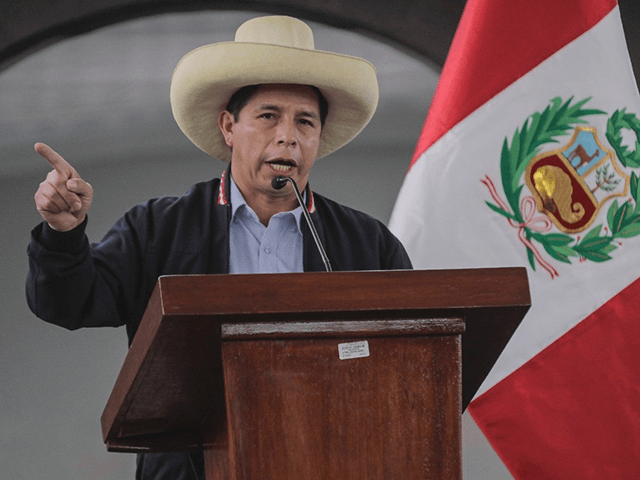Peruvian high court investigative judge Juan Carlos Checkley Soria sentenced the nation’s former president, Pedro Castillo, on Thursday to serve 18 months in preventive prison on charges of “rebellion” and conspiracy to abuse authority.
Castillo was impeached and arrested on December 7 after attempting to dissolve the nation’s congress to stay in executive power as part of a failed “self-coup” (autogolpe). The now-former communist president will remain detained until June 6, 2024, pending his corresponding trial, after which he could face between ten to 20 years in prison if found guilty.
Judge Checkley Soria did not grant a similar sentence to Aníbal Torres, Castillo’s adviser who served as Peru’s prime minister from February to November 2022 and who was among those present alongside Castillo when he attempted to dissolve Congress. The judge ordered Torres to present himself regularly to the court and prohibited him from leaving the capital city of Lima while imposing a fine of 20,000 Peruvian soles (roughly $5,200).
While the now-former president will remain detained awaiting his trial, leftist rioters and sympathizers of the former communist president continue to spread havoc across the nation, causing substantial damage to infrastructure and to the nation’s economy. The casualty toll of leftist riots rose to 20 deaths and over 187 injured at press time as the protests enter their second week.
As a result of the ongoing riots, Peru’s new president and Castillo’s former vice president, Dina Boularte, declared a nationwide 30-day state of emergency on Wednesday that suspends some civil rights in the country, including rights of assembly and freedom of movement.
On Thursday, intense clashes between rioters and the Peruvian military left seven dead and 52 injured in the south-central city of Ayacucho. Authorities confirmed an eighth death on Friday morning. As a result, the city’s Regional Health Directorate declared a red alert across all health centers in the region at 11:30 p.m. local time.
Through a statement released on Thursday, Ayacucho’s regional government blamed President Dina Boluarte, Minister of the Interior César Cervantes, and Minister of Defense Luis Alberto Otárola for the deaths and injured after Thursday’s clashes, calling for their immediate resignation.
Peruvian Attorney General Eliana Revollar announced on Friday that she filed a criminal complaint with the Huamanga Prosecutor’s Office to investigate the alleged use of firearms against the protesters.
Boularte sent her condolences to the families of the dead in Ayacucho and made calls for peace through a post on her personal Twitter account.
“We mourn the crying of the mothers in Ayacucho and we suffer the pain of families throughout the country. Today, in a sad day of violence, we again mourn the death of Peruvians. My deep condolences to the bereaved. I reiterate my call for peace,” the post read.
The ongoing roadblocks the rioters caused have so far claimed the lives of two Peruvian citizens, according to local media.
Peruvian newspaper La República reported on Thursday that 32-year-old Lucio Quispe Ccallo died as a consequence of the roadblocks. Ccallo was reportedly run over in the southern town of Yanaoca on Monday. After being stabilized by a local health center, an ambulance attempted to transport Ccallo to the city of Cusco twice so that Ccallo could receive life-saving treatment at another health center. However, rioters did not allow the ambulance to go through despite the urgent requests of both Ccallo’s family members and health personnel. Ccallo was declared dead on Thursday, December 15, at 03:45 a.m.
Similarly, La República reported on Thursday that 45-year-old Peruvian police officer Efrén Cruz Cardeña died in Canchis province of a head injury after his motorbike collided with the stones that the rioters had left on the road.
The police officer had been transferred to a health center but did not receive treatment due to a lack of personnel. Cruz Cardeña was declared dead at a health center at the city of Combapata on Thursday.
While President Boularte had first proposed to bring forward the nation’s next general elections for April 2024 instead of 2026, she has now proposed on Wednesday that they could be moved forward to December 2023. Peru’s Congress suspended its Thursday session and is scheduled to resume debating Boularte’s proposal on Friday.
Christian K. Caruzo is a Venezuelan writer and documents life under socialism. You can follow him on Twitter here.
